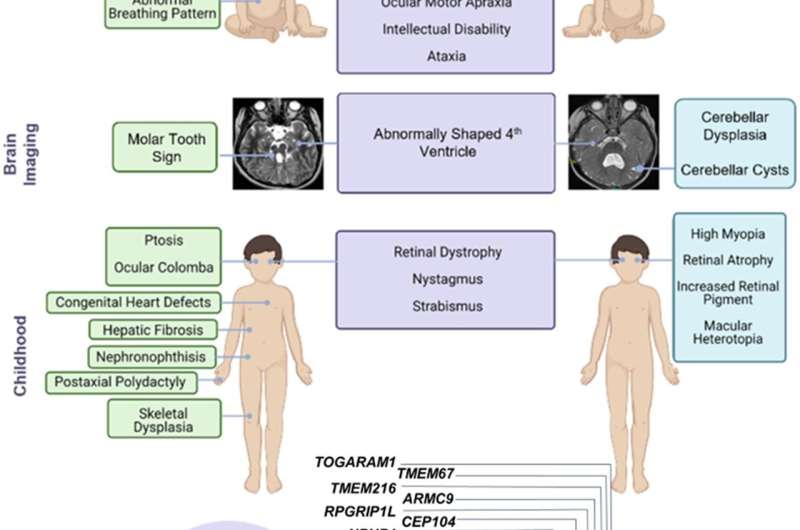Graphical abstract. Credit: DOI: 10.1093/braincomms/fcab163
Little Addison Black has had a difficult start to life as she has battled a rare condition that only affects a handful of youngsters worldwide.
The five-year-old has Poretti-Boltshauser syndrome, an illness which causes delayed brain function and speech problems that can lead to an array of challenging behaviors.
It was only recently that Addison was given this diagnosis as years earlier her family had been told the devastating news that the youngster had a life-limiting brain development disorder known as Joubert syndrome.
But, in a new study published in Brain Communications, Newcastle University experts analyzed families with possible genetic causes of brain abnormalities and a change to Addison's diagnosis was made.
Reviewing symptoms
Using expert review of clinical symptoms, brain scans and genetic sequencing through the Genomics England 100,000 Genomes Project and the Deciphering Developmental Disorders study, four UK families had their child's diagnosis changed to the new syndrome, Poretti-Boltshauser.
Professor John Sayer, Deputy Dean of Clinical Medicine at Newcastle University, said: "Our study shows that by carefully re-evaluating children with a clinical label of Joubert syndrome, we were able to make both a clinical and genetic diagnosis of a much rarer, but milder, syndrome called Poretti-Boltshauser.
"Our study revealed that children with congenital brain disorders may have a delayed or incorrect diagnosis due to poor recognition of key features on brain imaging and incomplete genetic testing."
Scientists worked with families in the UK who attended a genetics clinic run by Professor Sayer at the Freeman Hospital in Newcastle. Professor Eugen Boltshauser, a retired children's brain specialist whom the syndrome is named after, was also involved to help ensure a correct clinical diagnosis.
A key feature of Poretti-Boltshauser is that it is non-progressive and doesn't lead to kidney failure and other life-threatening complications associated with other brain diseases such as Joubert syndrome.
The findings are important for the NHS as genome sequencing is becoming mainstream so this rare disorder can be identified quickly if considered alongside other diseases which mimic its characteristics.
Professor Sayer, also a Consultant Nephrologist at Newcastle upon Tyne Hospitals NHS Foundation Trust, said: "It is important because it allows patients with rare brain disorders a much better chance of a correct clinical and genetic diagnosis.
"This will help many families in the UK to get more precise information about their child's condition and know in much clearer terms what the future will hold."
Shock diagnosis
It was a shock to Addison's parents Carli and Stewart that their daughter's diagnosis was changed following genetic screening, however, they were relieved that they could connect with other families in a similar position to help them through difficult times.
Mother-of-two Carli, 34, a former nurse from Wallsend, North Tyneside, said: "When your child has complex needs then your whole life understandably revolves around them and making sure they're okay and have the best treatment possible.
"We knew from a very young age that something was not right with Addison's development as she wasn't hitting the milestones—she couldn't make eye contact, had head twitching and didn't walk until after the age of three.
"When we were given the initial diagnosis of Joubert syndrome it was heartbreaking as it's a life-limiting illness and that was always in the back of our minds.
"But to then be told after genetic screening that Addison had a different condition it came as a bolt out of the blue as we didn't expect it and we had never heard of Poretti-Boltshauser syndrome.
"To be given this diagnosis means that we can speak to the few other families in a similar situation and learn from one another's experiences, which is so important in our understanding of Addison's complex needs."
Addison is regularly monitored by specialists and she enjoys life at school and spending time with her older brother Coby, 10.
Further research at Newcastle University will focus on finding as many families as possible with Poretti-Boltshauser syndrome so that they can benefit from a correct diagnosis and better prognosis.
The experts will also continue to work with Professor Boltshauser and patients to identify how well people with this condition do in adult life.
More information: Laura Powell et al, Identification of LAMA1 mutations ends diagnostic odyssey and has prognostic implications for patients with presumed Joubert syndrome, Brain Communications (2021). DOI: 10.1093/braincomms/fcab163
Journal information: Brain Communications
Provided by Newcastle University
























